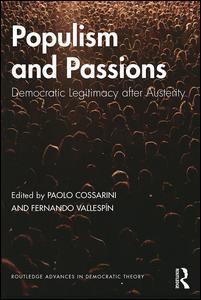Description
Populism and Passions
Democratic Legitimacy after Austerity
Routledge Advances in Democratic Theory Series
Coordinators: Cossarini Paolo, Vallespín Fernando
Language: English
Subject for Populism and Passions:
Keywords
Existing Group Differences; austerity policies; Occupy Wall Street; right and left-wing trends; Invernizzi Accetti; emotional engagement; UK Independence Party; democratic legitimacy; UK Voter; contemporary populism; Populist Mind Sets; Voter Irrationality; July Referendum; Negative Relationship; Common Language; Performative Differences; Left Wing Populism; Red Green Alliance; Dansk Folkeparti; Presumptive Equality; Laclau’s Theory; Metonymic Displacement; Private Tv Channel; Fantasmatic Logic; Part Iii; Populist Phenomenon; Fantasmatic Narratives; Laclau’s View; Longer Respondent; Socialist People’s Party
Publication date: 05-2019
· 15.2x22.9 cm · Paperback
Publication date: 05-2019
· 15.2x22.9 cm · Hardback
Description
/li>Contents
/li>Readership
/li>Biography
/li>
There is a consensus that right, and left-wing populism is on the rise on both sides of the Atlantic, from Donald Trump in the United States, to Spain?s leftist Podemos. These may utilize different kinds of populist mobilizations but the fact remains that elite and mass opinion is fuelling a populist backlash.
In Populism and Passions, twelve scholars engage with discourse analysis, democratic theory, and post structural political thought to study the political logic of passion for contemporary populism. Together these interdisciplinary essays demonstrate what emotional engagement implies for the spheres of politics and the social, and how it governs and mobilizes individuals. The volume presents:
- Theoretical and empirical implications for political analysis;
- Chapters on the current rise of populism, both right and left-wing trends, their different ideological features, and their relationship with the logic of passion;
- Theoretical implications for the future study of populism and democratic legitimacy.
A timely analysis of this political phenomena in contemporary Western democracies, Populism and Passions is ideal for students and scholars in political theory, comparative politics, social theory, critical theory, cultural studies, and global studies.
Introduction: Populism, Democracy, and the Logic of Passion Part 1: Ordering the Political Realm 1. Political Affects in the Neuroscientific Age 2. Populisms and Emotions 3.Populism versus Technocracy: Performance, Passions, and Aesthetics Part 2: Passionate Logic and Discourses in Times of Austerity 4. Our Damned Weakness: Tensions between Reason and Emotion in Podemos 5. The Political Logic of Populist Hype: The Case of Right-wing Populism’s ‘Meteoric Rise’ and its Relation to the Status Quo 6. Populism and the Use of Tropes 7. Emotions and the Left in Denmark. Towards Left-Wing and Mainstream Populism Part 3: Passions and Democratic Legitimacy 8. Filling the Vacuum? Passion, ‘the People’, and Affective Communities 9. Passion, Excess, and Fear of the Mob - Populism as Ideology 10. Populism and the Restructuring of the Public Sphere
Paolo Cossarini is Postdoctoral Fellow at the School of International Studies at the University of Trento, Italy. He previously taught Politics and International Relations at Loughborough University, UK. He has held visiting positions at the Paris Institute of Political Studies, Queen Mary University of London, and has been a member of the research project ‘The political consequences of the economic crisis’ funded by the Spanish Ministry of Education. His research focuses on democratic theory and populism, Spanish politics and nationalism, and the role of emotions in protest movements and political communication, as well as border and migration studies. He has published in Global Discourse, European Political Science, and Revista de Estudios Políticos, among other journals
Fernando Vallespín is Professor of Political Science at the Universidad Autónoma de Madrid, Spain. He has directed the Department of Political Science and International Relations and the Centro de Teoría Política at the same University. He has also been a postdoctoral Fulbright researcher at Harvard University, and has been visiting professor at the universities of Frankfurt, Heidelberg, Veracruz and Malaysia. He has published several books and over one hundred academic papers and chapters. Additionally, he was President of the Centro de Investigaciones Sociológicas (CIS) between May 2004 and May 2008, Academic Director of the Fundación Ortega-Marañón (2012-2015), President of the Spanish Association of Political Studies (2013-2015) and member of IPSA’s Executive Council (2014-2016).




